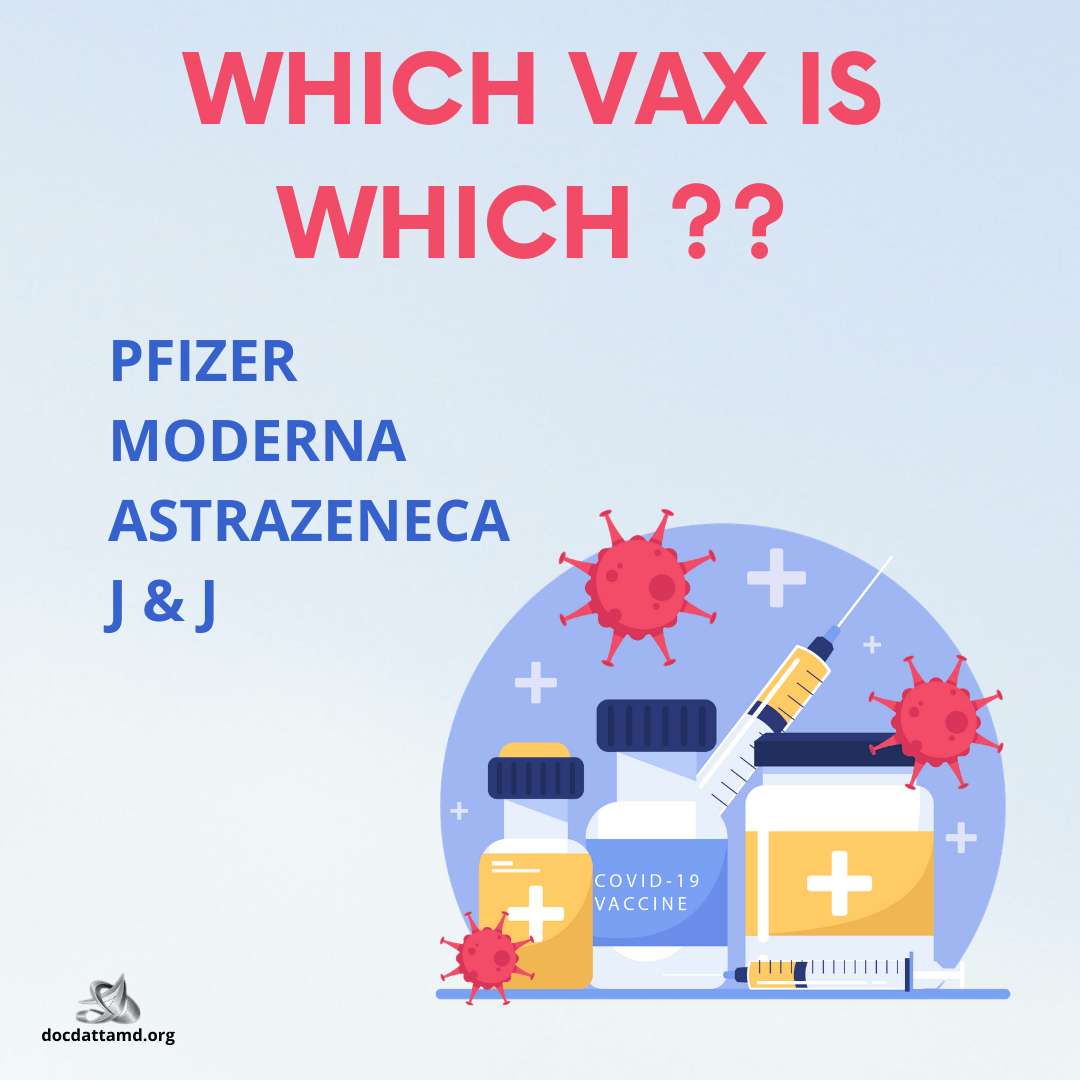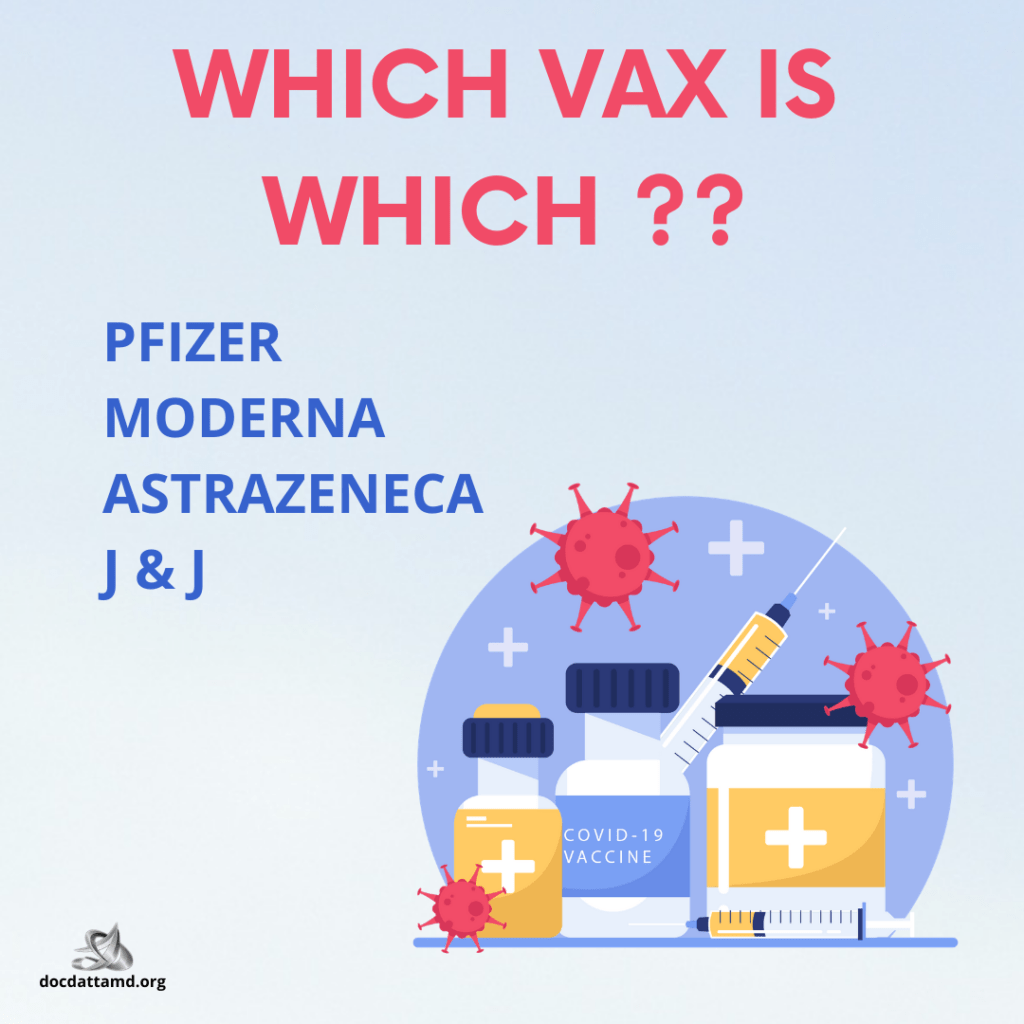
By Dr. Arnab Datta
Posted on March 30, 2021

So far, more than 143 million doses have been administered in the US.
The Food and Drug Administration approved three vaccines to prevent COVID-19
1. Pfizer-BioNTech COVID-19 Vaccine
Type of vaccine: mRNA
Age Indications: 16 years of age and older
Schedule:-
2-dose series separated by 21 days
A series started with COVID-19 vaccine (Pfizer) should be completed with this product.
2. Moderna COVID-19 Vaccine
Type of vaccine: mRNA
Age Indications: 18 years of age and older
Schedule:-
2-dose series separated by 28 days
A series started with COVID-19 vaccine (Moderna) should be completed with this product.
3. Johnson and Johnson Janssen COVID-19 Vaccine
Type of vaccine: Viral vector
Age Indications: 18 years of age and older
Schedule:-
Single Dose
As of February 27, 2021, large-scale (Phase 3) clinical trials are in progress or being planned for two COVID-19 vaccines in the United States: simple words –
This year, we’re expected to see 200 million doses from Pfizer by July and anywhere from 600 million to 1 billion doses from Moderna.
For a COVID-19 Tracker click link below:
https://covid.cdc.gov/covid-data-tracker/#vaccinations
In the earlier stages of the rollout, Pfizer’s vaccine has been more likely to be offered in hospitals, medical centers, or large vaccine sites that have the ultracold storage that it was initially believed to need. Moderna’s shots, by contrast, have had less-extreme cold-storage requirements, making them more accessible for smaller pharmacies or offices in addition to larger venues. But now a new study has indicated that Pfizer’s vaccine can be stored and transported at temperatures similar to what a consumer freezer provides.
The Pfizer and Moderna vaccines are made using messenger RNA, or mRNA, a technology that delivers a bit of genetic code to cells — in effect, a recipe to make the surface protein (known as spike) on the SARS-2 virus. The proteins made with the mRNA instructions activate the immune system, teaching it to see the spike protein as foreign and develop antibodies and other immunity weapons with which to fight it.
The J&J and AstraZeneca’s vaccine uses a different and more traditional approach to instruct human cells to make the SARS-2 spike protein, which then triggers an immune response. It is what’s known as a viral vectored vaccine. A harmless adenovirus — from a large family of viruses, some of which cause common colds — has been engineered to carry the genetic code for the SARS-2 spike protein. Once the adenovirus enters cells, they use that code to make spike proteins. J&J employs this same approach to make an Ebola vaccine that has been authorized for use by the European Medicines Agency.
Based on evidence from clinical trials, the Pfizer-BioNTech vaccine was 95% effective at preventing laboratory-confirmed COVID-19 illness, Moderna vaccine was 94.1% effective and the J&J/Janssen vaccine was 72.3% effective. The above data was from people without evidence of previous infection.
It is important to note that individuals are unlikely to be offered a choice of which vaccine they want. Supplies are too scarce. The vaccine available at the place where you are being vaccinated is the one you’ll get.
https://www.cdc.gov/coronavirus/2019-ncov/vaccines/different-vaccines.html
CDC (Centers for Disease Control and Prevention) recommended who should be vaccinated first.
Phase 1a – (17.6 million)
Healthcare personnel and residents of long term care facilities should be offered the first doses of COVID-19 Vaccine (17.6 million)
Phase 1b – (49 million)
-Frontline essential workers
-People aged 75 years and older
Phase 1c – (129 million)
-People aged 65-74 years
-People aged 16-64 years with an underlying medical condition
-Other essential workers
To check if you are eligible click – https://www1.nyc.gov/site/doh/covid/covid-19-vaccine-eligibility.page
Check the link below to see the list of underlying health conditions of eligible candidates above the age of 16
https://www.ny.gov/sites/ny.gov/files/atoms/files/ComordbititiesCOVID19.pdf
Ten states will open eligibility for COVID-19 vaccines to all adults this week. Kansas, Louisiana, North Dakota, Ohio, Oklahoma and Texas will remove vaccine restrictions for those 16 and older Monday (March 29, 2021). Minnesota will follow on Tuesday (March 30, 2021); Indiana and South Carolina on Wednesday (March 31, 2021); and Connecticut on Thursday (April 1, 2021).
New York is making anyone age 30 and older eligible Tuesday (March 30, 2021), and from April 6, 2021 all residents 16 and older will be allowed to get the vaccine.
Currently, the following groups are getting vaccinated in New York.
New Yorkers aged 30-plus, immunocompromised residents age 16 or older, frontline essential workers, including teachers, public works employees, social service and child service caseworkers, government inspectors, sanitation workers, nonprofit and election workers, and others (Phase 1B)
Residents and staff of nursing homes, long-term care and skilled nursing facilities, and high-risk health care workers (Phase 1A)
https://covid19vaccine.health.ny.gov/phased-distribution-vaccine#phase-1a—phase-1b
For more details on booking an appointment for Covid-19 vaccine click link below
https://www1.nyc.gov/site/doh/covid/covid-19-vaccines.page
COVID-19 vaccination providers cannot:
Regardless of whether you have health insurance or not, the COVID-19 vaccine will be free for all Americans, according to the Centers for Medicare and Medicaid Services. The government organization also said it plans to make sure the providers can get reimbursed for any FDA-approved coronavirus treatments you’re charged for.
But they can seek appropriate reimbursement from the recipient’s plan or seek reimbursement for uninsured vaccine recipients from the Health Resources and Services Administration’s COVID-19 Uninsured Program.
https://www.cdc.gov/coronavirus/2019-ncov/vaccines/keythingstoknow.html
Who should not get the vaccine
The Centers for Disease Control and Prevention on Sunday said people who have experienced severe reactions to prior vaccines or injectable drugs can still get the Pfizer/BioNTech vaccine for Covid-19, but should discuss the risks with their doctors and be monitored for 30 minutes afterward.
The FDA has published a fact sheet on the Pfizer vaccine and a separate fact sheet on the Moderna one. Both publications caution: “A severe allergic reaction would usually occur within a few minutes to one hour after getting a dose…” Both sheets then list several signs and symptoms of such an allergic reaction:
If you have a history of allergies, you can expect to be monitored for 15 to 30 minutes after receiving the vaccine.
The FDA also recommends you should not take the Pfizer vaccine if you’ve ever had a severe reaction to any of these ingredients:
The FDA similarly recommends avoiding Moderna’s vaccine if you’re allergic to any of its ingredients:
The FDA similarly recommends avoiding Johnson & Johnson’s vaccine if you’re allergic to any of its ingredients:
No. People with COVID-19 who have symptoms should wait to be vaccinated until they have recovered from their illness and have met the criteria for discontinuing isolation. Those without symptoms should also wait until they meet the criteria before getting vaccinated. This also applies to people who get COVID-19 before getting their second dose of vaccine.
Children under 16 years old will not be eligible to receive the vaccination at this stage.
Click link below to a read study for COVID-19 Vaccine on children
https://clinicaltrials.gov/ct2/show/NCT04649151
The COVID-19 vaccines are not made from a live virus. They were not tested on pregnant or breastfeeding people, but experts think they should be just as safe for these groups as for others.
If you are pregnant or breastfeeding and are eligible to be vaccinated, you may choose to receive the vaccine. If you have questions about your situation and whether to take the vaccine, talk to your health care provider. If you are pregnant and develop a fever after being vaccinated, you should take acetaminophen, such as Tylenol®. If you are considering pregnancy and are eligible to be vaccinated, vaccination is recommended.
If you are pregnant and have received a COVID-19 vaccine, we encourage you to enroll in v-safe. V-safe is CDC’s smartphone-based tool that uses text messaging and web surveys to provide personalized health check-ins after vaccination.
Click below link to get more information on how to enroll in V-Safe
https://www.cdc.gov/coronavirus/2019-ncov/vaccines/safety/vsafe.html
While it’s currently not required in the US to get a vaccine, your employer certainly can make vaccination a term as part of employment policies. According to the US Equal Employment Opportunity Commission, US employers can require employees to receive vaccinations against diseases that have been recognized as pandemics.
https://www.eeoc.gov/es/node/131879
In March of 2020, just weeks after the World Health Organization (WHO) declared COVID-19 a global pandemic, millions of vacationers flocked to beaches, cities, and mountain towns in the United States to celebrate spring break. Spring break was a prime opportunity for the new coronavirus to spread quickly — and it did,
Dr. Edwin Bosa-Osorio, a family physician at Community Health of South Florida, Inc., expects we’ll see another surge in COVID-19 cases after this year’s spring break.
“For events like spring break, this means ignoring well-known infection control measures recommended by health professionals, thus creating the likelihood of a resurgence,” said Bosa-Osorio, noting that popular spring break locations like Florida no longer have mask mandates.
https://www.healthline.com/health-news/will-2021-spring-breakers-trigger-a-new-covid-19-surge